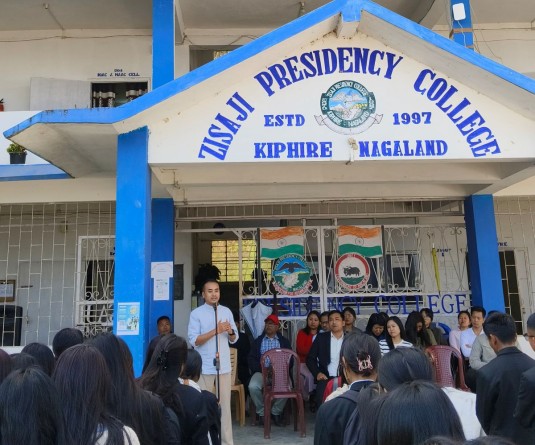
Morung Express News
August 8
DIMAPUR: Naga Peoples’ Movement for Human Rights (NPMHR) sources have said that the Indian Forest Act, 1927 which is a continuation of the erstwhile British colonial Forest policy has been used extensively by the Government of India on the tribal peoples and the forests community causing forceful relocation in the name of conservation and development. Unfortunately, most (Nation) states have historically considered Indigenous Peoples as stumbling blocks and impediments to national development strategies. They have pursued integrationist and assimilationist policies, engaged in overt repression and forcible relocation, and have ignored Indigenous Peoples’ rights and their very existence in order to have control over the land and resources, the sources further added. In recognition of the situation of indigenous people worldwide, the 9th August is commemorated as the International day of Indigenous Peoples. As the United Nations progress towards the second Decade of Indigenous Peoples, there are many expectations that the state parties will also commit themselves to ameliorate the marginalized and impoverished conditions of their respective wards.
NPMHR in a solidarity statement to the ‘Campaign for Survival and Dignity’ - a federation of tribal and forest community organizations from nine Indian States (Rajasthan, Gujarat, Maharashtra, Madhya Pradesh, Chattisgarh, Orissa, Jharkhand, Tamil Nadu, Dadra and Nagar Haveli) struggling for recognition of community rights over ancestral land and resources, has termed this imposition on its vulnerable communities contradicting its commitment to the recognition of ‘cultural diversity’ legitimate practices categorized by the international community as ethnocide. The organization stated that the devastating effect that this Act has had upon Indigenous/Tribal Peoples, their cultures, lands and territories has been well documented. Since India’s Independence, ‘40 million tribals alone have been thrown out of their homes by dams, mines, industry and other projects. More than 5,000 forest villages still have no legal recognition.
Since 2002, lakhs of people have lost their crops, their lands and their homes in eviction drives’. The existing policy permits forcible relocation even in cases where this will have “significant adverse effects” on Indigenous peoples’ “cultural survival”, which is a flagrant violation of the right to cultural integrity, a human right protected as part of customary international law and therefore binding on all states.
An open letter to popular organisations in the northeast by the National Convenor, Pradip Prabhu, Campaign for survival and dignity, New Delhi states ‘unlike the areas under the Sixth Schedule and various State laws in the Northeast, which at least guarantee recognition of community rights on paper, the tribal and forest peoples of mainland India have never seen their rights recognized by any law. Instead they have been classified as ‘encroachers’ and trespassers in the forest, which is ruled by the dictatorial and corrupt Forest Department’. As a response, the solidarity statement adds that ‘NPMHR supports the immediate passage of the Scheduled Tribes (Recognition of Forest Rights) Bill 2005 in the interest of justice and dignity for the tribal peoples and forest communities of India who represents one of the most oppressed and excluded section in the life of Independent India’.
The Government of India’s new Scheduled Tribes (Recognition of Forest Rights) Bill if enacted is expected to address and safeguard the concerns of community rights over land and resources including their participation in forest management. On August 15th, groups in the nine States where the Campaign has a presence will be staging demonstrations in favour of the Bill.





